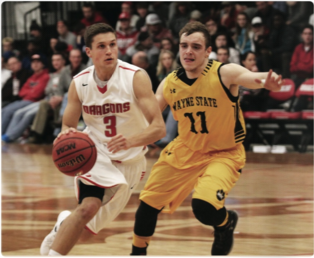Jan 5, 2018Veteran Advice
If experience at different levels is the ticket to success, it’s no wonder Chad Walthall is thriving as Head Men’s Coach at Minnesota State University Moorhead. Starting his career at the high school level, with stops at NCAA Division III and Division I, he has led the Dragons to an 89-16 record over the past three years and to the NCAA Division II tournament four of the last six seasons.
In 2010, Walthall took over an MSUM program that had gone 63-74 in five previous campaigns and been absent from the NCAA Tournament for 45 years. Emphasizing teamwork and taking care of the ball, he’s guided the squad to winning seasons ever since, with Northern Sun Intercollegiate Conference (NSIC) North Division titles the past four years.
Prior to MSUM, Walthall was Assistant Coach at the University of Iowa, following a successful run as Head Coach at Division III Loras College. He’s served as an Assistant Coach at Eastern Michigan University and St. Olaf College, and began his career as Head Coach at Redwood Valley High School in Redwood Falls, Minn.
While in college, you starred in football and did not even play basketball. How did you end up as a basketball coach?
I actually was more heavily recruited for basketball, but as an athlete, I felt I would be more successful as a college quarterback. I loved the position, and I loved handling the ball on every play. I also had the opportunity to compete for Hall of Fame football coach Jim Christopherson and a great program at Concordia College. It was a decision I will never regret.
But I knew that I wanted to be a college basketball coach from an early age and I never wavered from that. In fact, my first year of college I coached an eighth grade basketball team. After that I was an assistant coach for Concordia all the way through my senior year. I would finish playing football in November, and even though basketball had already started, I would jump right in. So I went from playing high school basketball directly into coaching. I was never really out of it.
Your team recorded the fewest turnovers nationwide in D-II last year and also in 2015. How do you teach the art of ball handling and minimizing mistakes?
We put an emphasis on taking care of the ball. For example, when an athlete has a turnover in practice, he jumps down and does five quick push-ups. We don’t yell at them and it’s not talked about, it’s just expected. This helps stress the importance of valuing possession.
During practices, we work on passing and dribbling a lot. We often do this through fun games as part of warm-ups. For example, we do a box drill where it’s four on defense versus three on offense. The defenders are focused on intercepting the ball so those on offense have to work extra hard to control the ball.
What do you do when players make a ball-handling error during a game?
I don’t believe in dwelling on mistakes. What I always tell our players, and try to tell myself, is that you aren’t doing anybody any good by holding onto it and letting it fester. It’s going to affect your next play, which will not only hurt you, but your entire team. We stress this on a daily basis. Otherwise you lose yourself in the moment and you won’t be able to concentrate on the task at hand.
One of your assistant coaches, Tim Bergstraser, was an NABC/Under Armour 30-under-30 honoree. What do you do to develop your assistant coaches?
I think it’s incumbent upon me to help my assistants grow and become the best leaders of young men they can possibly be. That can’t happen if they are sitting on the sidelines and watching. So I give them a great deal of responsibility. I recognize their strengths and put them in roles where they will be most comfortable. They know they have the freedom to be actively involved.
Having hands-on assistants who concentrate on certain areas also helps me be a better coach. It minimizes my responsibilities and I can put my eyes where I need them to be. This is also good for the program as a whole, because players tend to respect the assistant coaches more when they have meaningful roles.
What are your goals for your future teams?
We don’t really talk about championships. We focus more on the task at hand and doing the things that will help us be successful. We try to stay in the moment and talk about what we can do today to improve as a program. If we make a poor play, we don’t over-analyze it. The same thing goes if we have a great play. We don’t dwell on it — we move on to the next play as soon as possible. We take that approach with everything we do.



